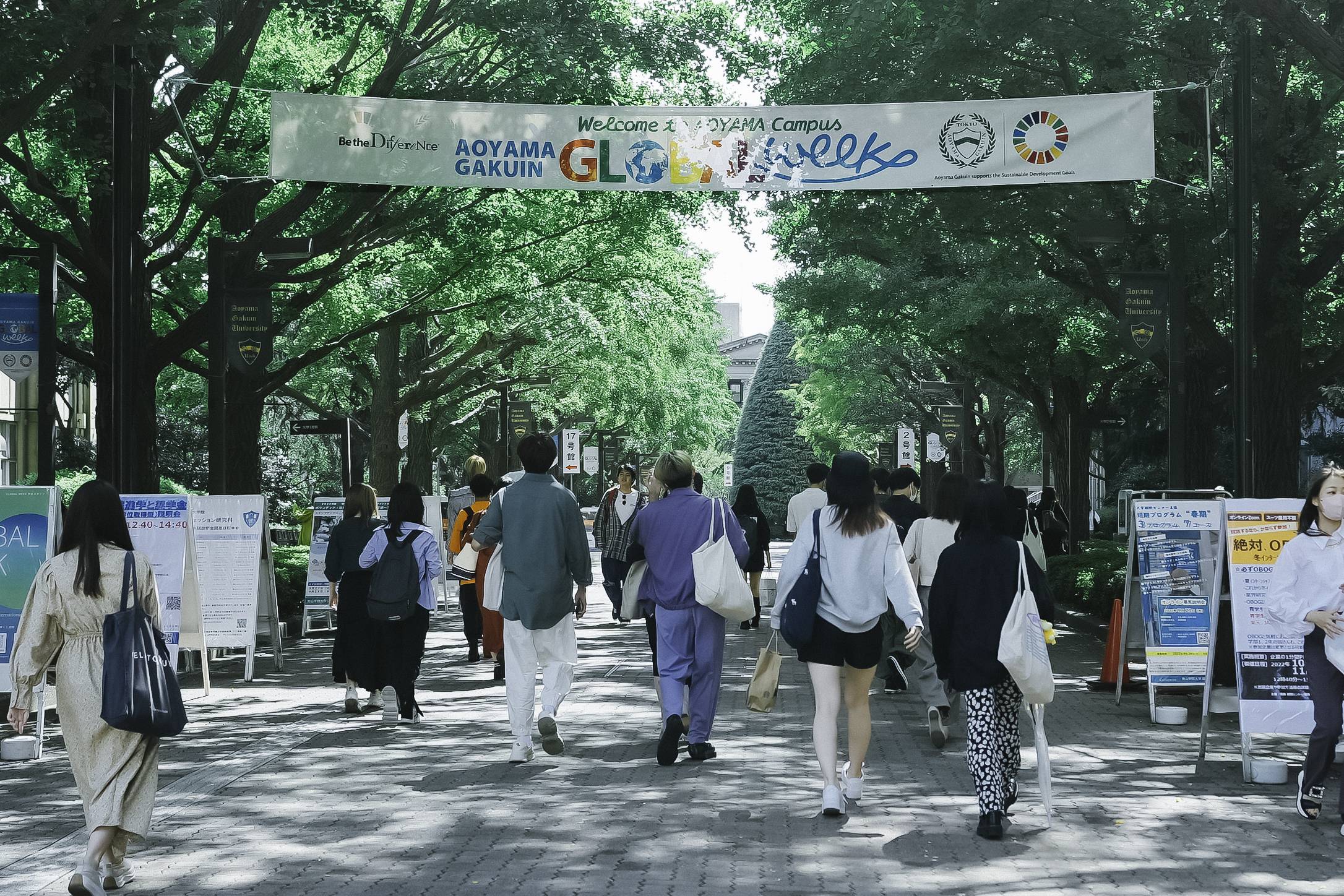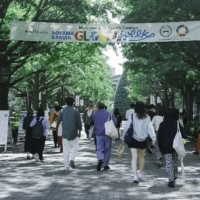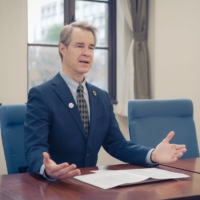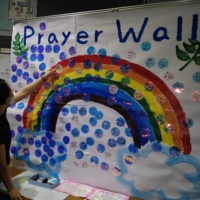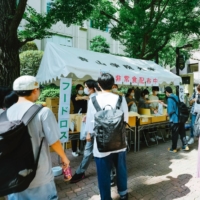Aoyama Gakuin, a comprehensive educational institution in Tokyo’s Shibuya Ward, held its second Aoyama Gakuin Global Week from Sept. 23 to Oct. 1. AGGW is an annual event highlighting activities and projects associated with the United Nations sustainable development goals that take place on campus.
The first AGGW, held last year amid the COVID-19 pandemic, was organized by faculty members, but this year students participated in planning, promoting and operating the event, bringing in new ideas and the perspective of youth.
“We have always been international,” said Aoyama Gakuin Vice Chancellor Paul Tsuchido Shew, referring to Aoyama Gakuin’s history of almost 150 years as an international educational institution based on Christian faith. It consists of schools from kindergarten to graduate school, and has been pursuing the mission of nurturing global leaders who serve the public and contribute to society since its foundation in 1874. “The significance of being a Christian school back then in the Meiji Era (1868 to 1912) was found in the ability to offer global education to develop global perspectives. Now, an international mindset is just as important as it was 150 years ago,” Shew said.
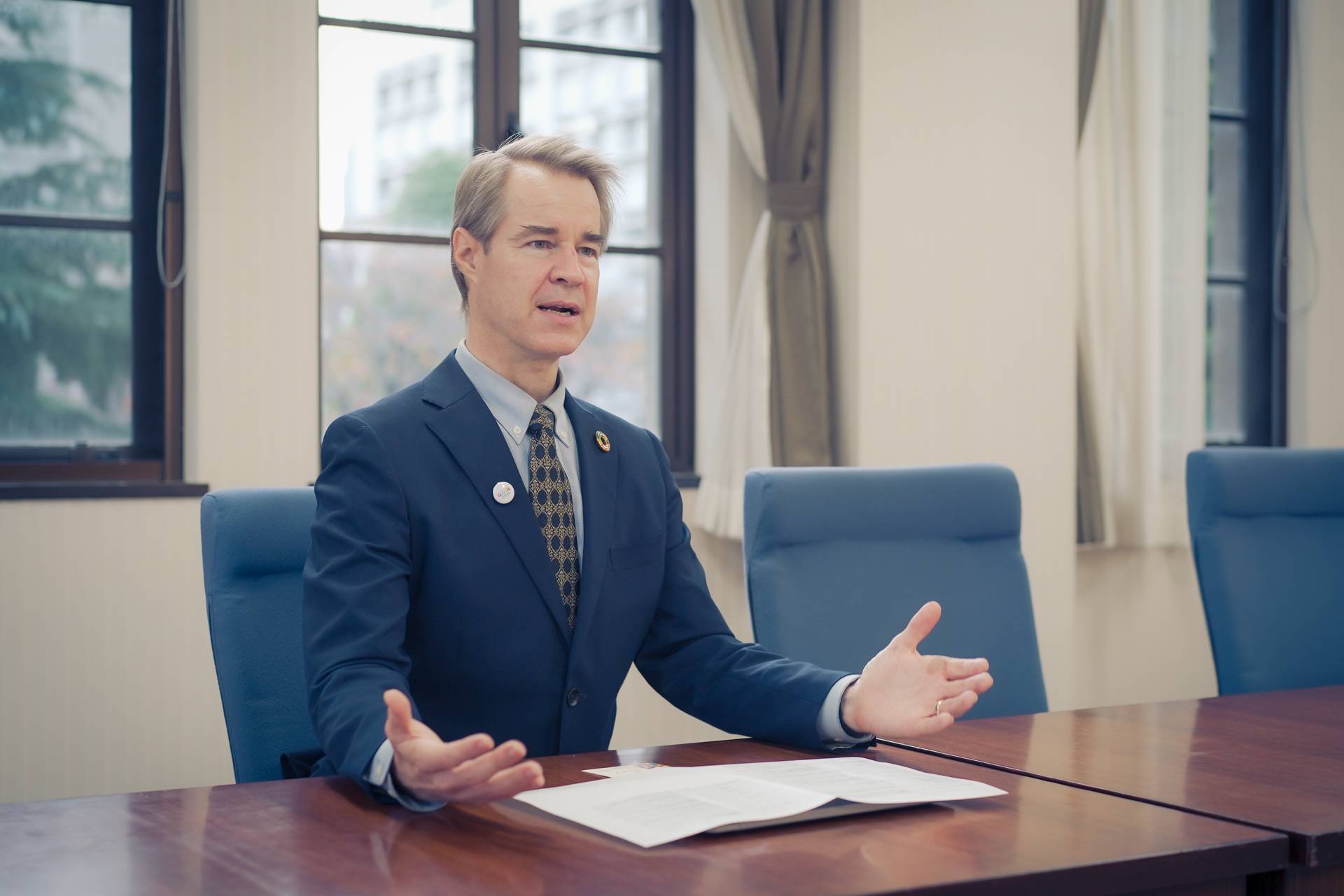
Similar to the idea of “leave no one behind” in achieving the SDGs, Aoyama Gakuin aims to build up persons “who actively take responsibility for all people and for society in a spirit of love and service,” and has been offering classes and activities designed to fit this purpose since long before sustainability became a common concern of the global community.
Sermons offered at the six Methodist chapels on campus every day have often dealt with topics related to sustainability. Over the period of a few decades until 2018, students of the elementary, junior high and senior high schools visited the Philippines more than 20 times to learn about the reality of poverty and gain hands-on experience in supporting communities through Childfund Japan, a nonprofit engaged in child sponsorship and community development.
There have also been many sustainability-related subjects and seminars taught at the university. AGGW aims to celebrate and better visualize these efforts and to encourage more people to recognize and use these opportunities to make the world more just, more peaceful and more sustainable.
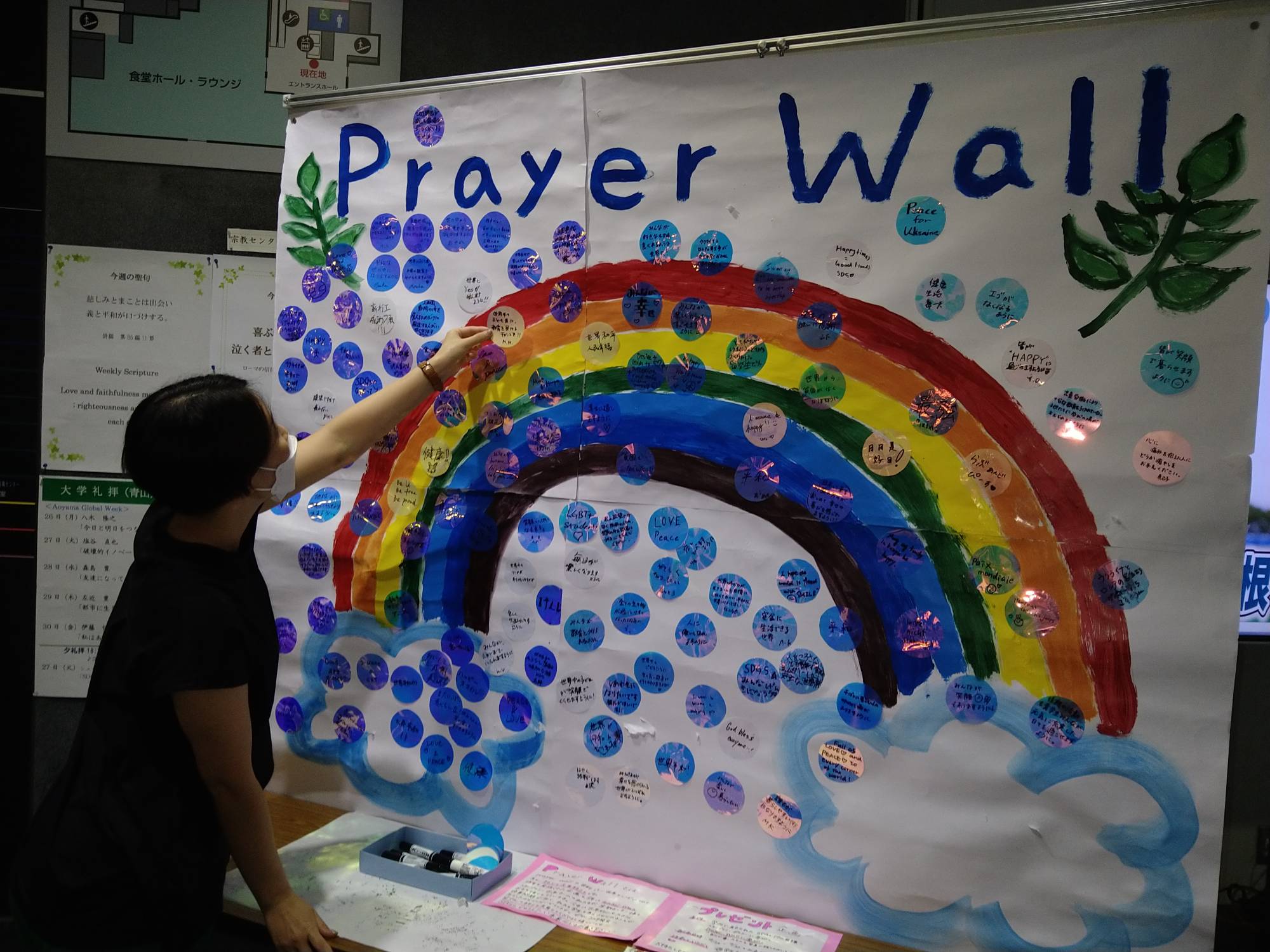
There were about a dozen more projects and activities conducted during this year’s AGGW than last year’s 36. Even though many of them were held online due to the pandemic situation last year, feedback from students was positive. Some students said they felt motivated to be given the opportunity to make their volunteer activities known to more people. There was a student group that placed free sanitary napkins and how-to instructions in both women’s and men’s restrooms in the university to raise awareness and understanding towards gender equality and gender freedom. This group was later accredited by the university for its efforts and contribution to AGGW.
Based on the success of last year’s event and the encouraging response from the students, the university decided to get the students involved in organizing this year’s event. About 40 members gathered voluntarily and participated from the preparation phase. One idea the students came up with was to broadcast campuswide announcements about AGGW beginning a week before the event. More than 10 activities were planned and operated by students or student groups.
One such activity was a stamp rally that consisted of 17 goals corresponding to the SDGs. At each rally point, information on SDGs was exhibited together with a QR code instead of a stamp to utilize digital resources and cut down on paper use — another student-generated suggestion.
One of the student-led projects was named “Let’s think about food loss.” Aoyama Gakuin has disaster relief supplies for over 23,000 students and 1,300 faculty members, as well as nearby residents, because the campus is designated as a temporary evacuation area. The food stockpiles need to be replaced before they expire, and a group of students came up with a plan to distribute the food in advance to prevent it from going to waste. They set up a tent on the main street of the campus and handed out the packages with flyers explaining Japan’s food waste situation to passersby. “We want our students to realize that globalization starts from each one of us and that they are capable of interacting with the world as global citizens through AGGW,” Shew said.
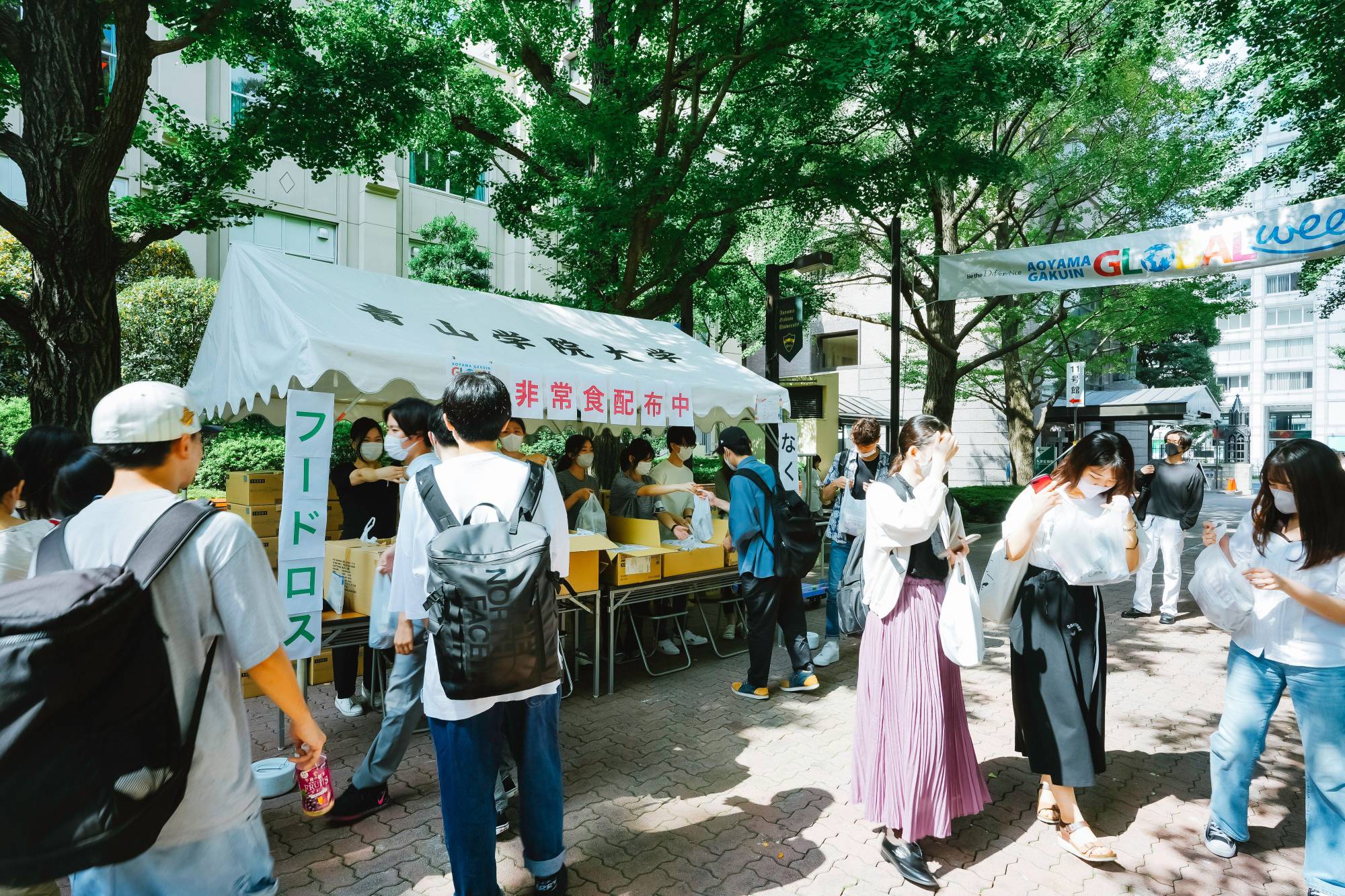
The event also helped build closer ties among different schools under Aoyama Gakuin, as well as between students and alumni. Even though all of the schools from the kindergarten to the graduate school are on the same premises, each had been independent and had little opportunity to collaborate with the other schools. During this year’s AGGW, a group of Aoyama Gakuin University students organized a workshop for the pupils of Aoyama Gakuin Elementary School to deepen their understanding of the SDGs. In addition, students of Aoyama Gakuin’s junior and senior high schools attended a panel discussion that featured various professionals, including a lawyer, an accountant and a doctor, who spoke about sustainability and careers.
Of the approximately 380,000 graduates Aoyama Gakuin has produced, many alumni are contributing in various ways to the sustainability of the international community. Shinobu Yamaguchi, who graduated from Aoyama Gakuin University in 1984, is one of them. She is currently serving as director of the United Nations University Institute for the Advanced Study of Sustainability, which is situated right across Aoyama-dori avenue from the main gate of Aoyama Gakuin. The Alumni Association of the Department of English and American Literature organized an online public lecture with Yamaguchi’s help on the topic of Application of Information and Communication Technology to Promote Sustainable Development, which was attended by more than 60 people.
“We hope that AGGW helped our students realize global challenges affect them, as well as other people and other countries,” Shew said.
For more information, visit https://www.aoyama.ac.jp/
https://www.aoyamagakuin.jp/aggw/



